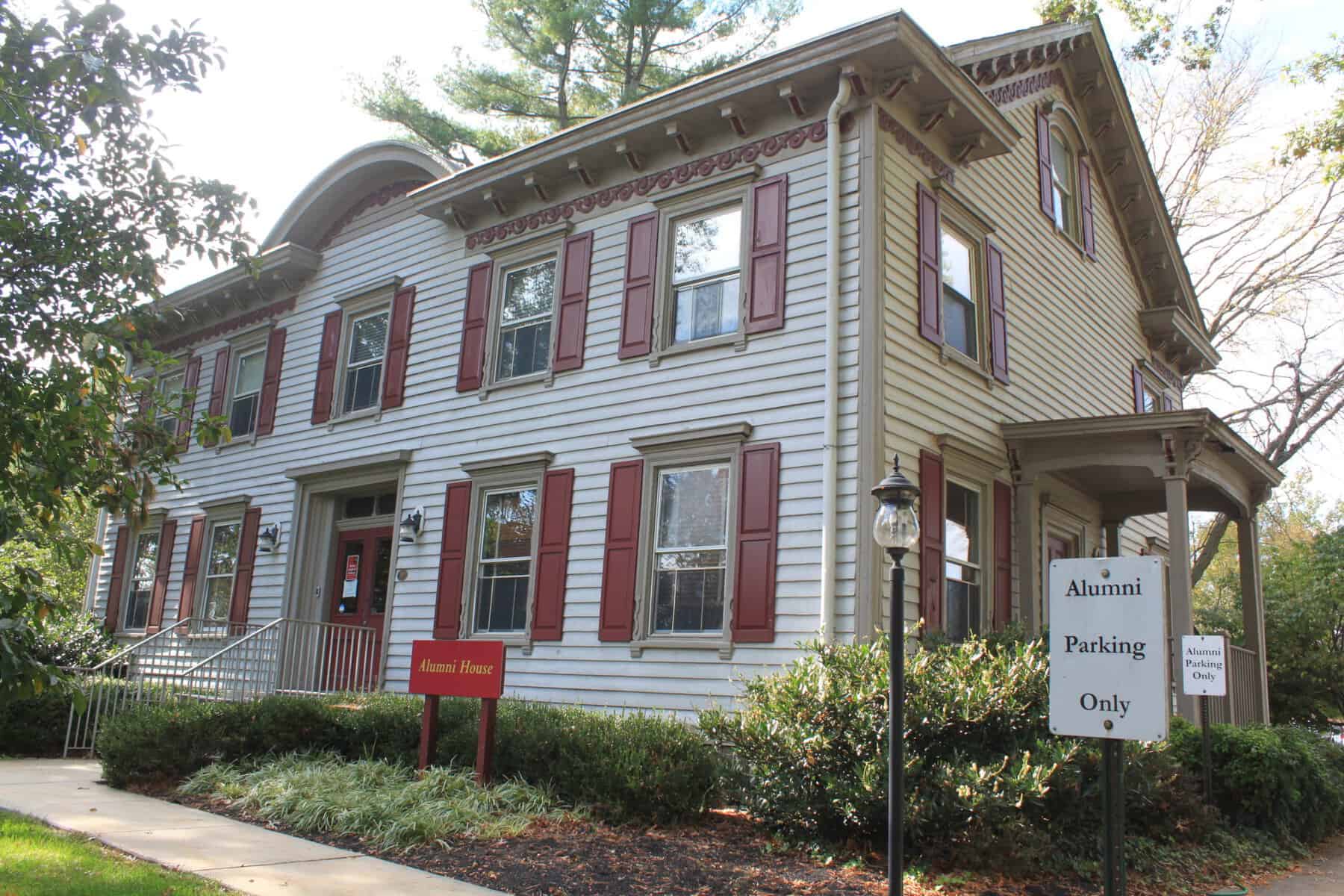Rider University has changed the name of the Van Cleve Alumni House, which is at the front of the campus, to the Alumni House after confirming that its namesake, Benjamin Van Cleve, was a slaveholder and supporter of slavery.
The Rider University Board of Trustees approved the name change at its Oct. 20 meeting.
The sign in front of the house was removed the next day and a new sign proclaiming it to be the Alumni House was put up in its place.
The Van Cleve House stands on land that was part of the 140-acre Glenburnie Farm that Rider University purchased in 1956 for its new Lawrence Township campus. The former Glenburnie Farm was the remainder of a 254-acre farm that Van Cleve purchased in the early 1770s.
Rider University was originally known as the Trenton Business College and was located in Trenton.
Rider University is following a trend to change the names of buildings and schools in response to alleged racism. Princeton University renamed its Woodrow Wilson School of Public and International Affairs to simply the Princeton School of Public and International Affairs because of Wilson’s alleged racist tendencies.
The Princeton Public Schools changed the name of its middle school from the John Witherspoon Middle School to the Princeton Middle School because of Witherspoon’s alleged racism. Witherspoon was a signer of the Declaration of Independence and a president of Princeton University.
The decision to rename the Van Cleve Alumni House follows the release of a report issued by the Task Force on Rider and the History of Slavery. It was formed to investigate Rider’s historical relationship and connection with slavery, and to recommend how the university could recognize and educate around that history.
When the task force was formed in July 2020, Rider University President Gregory Dell’Omo said that “to continue honoring a person (Van Cleve) while also living in ignorance of such appalling facts (as Van Cleve’s ownership of a slave) is simply no longer acceptable.”
Now that Van Cleve’s link to slavery has been confirmed, Dell’Omo said that Van Cleve’s support of slavery – both as a private citizen and as a legislator – makes it inappropriate for Rider University to continue to have one of its buildings named after him.
“Van Cleve chose to champion the institution of slavery even as other citizens in New Jersey awoke to the cause of abolition and the horrors of human bondage,” Dell’Omo said in a joint statement with John Guarino, who chairs Rider University’s Board of Trustees.
“Judged by the standards of his time or ours, Van Cleve’s actions and attitudes have no place in the Rider community,” Dell’Omo and Guarino said.
Van Cleve was born in Maidenhead Township – Lawrence Township’s historic name – in 1739. During the American Revolutionary War, he served as an officer in the First Hunterdon Militia and led troops into battle in the Battle of Long Island in 1776.
Van Cleve resigned from military service in 1777 after he was elected to the New Jersey Assembly. He served in the state legislature for more than 20 years, including stints as the Speaker of the Assembly during the 1780s.
Van Cleve bought the 254-acre property – Rider University’s future campus – in the early 1770s. There is evidence that he owned slaves, according to the final report of the Task Force on Rider and the History of Slavery.
Tax records from 1778, 1779, 1786 and 1799 show the Van Cleve owned at least one male slave. A runaway slave advertisement published in the New Jersey Gazette offers proof that he also owned one female slave named Dinah, the report said. She ran away from the Van Cleve farm in 1778.
While there are no documents that speak to Van Cleve’s opinion on slavery, records show that he voted against gradual abolition while he was serving in the New Jersey Assembly in 1794.
In 1798, Van Cleve voted to maintain slavery as a racial system of perpetual bondage, passing from mother to child, the task force report said. He continued his opposition to gradual abolition as a member of the New Jersey Assembly.
Van Cleve’s final vote on the issue occurred in 1802, when he voted to postpone discussion of gradual abolition until the next legislative session. He did not take part in the passage of the Gradual Abolition Act of 1804, because he lost re-election to the Assembly in 1803.
It is not clear how many slaves Van Cleve owned at his death in 1817. Court records show that a Black woman and a Black boy lived in the Van Cleve household, as well as a “bound” girl whose race is not known, the task force report said.
As to the former Van Cleve Alumni House, it had been historically referred to as the Van Cleve House by Rider University. It was used as a student residence in the early 1960s and renovated in 1969 to become the admissions office. It became the home of the alumni relations office.
The history of the house is not clear, according to “A Guide to Lawrenceville’s Historic Landmarks.” The 1992 booklet, which was prepared by the Lawrence Township Historic Preservation Advisory Committee and the defunct Cultural and Heritage Advisory Committee, lists historic properties in the township.
“Owned by Rider University, this unusual example of Italianate (architectural) style shows no evidence of having been an 18th-century house. It has a distinctive curved roofline and decorative trim,” the booklet said.
Charles Tichy, who was the historic restoration architect for the state Division of Parks and Forestry, inspected the house in the 1970s, the booklet said. He found clear evidence that the current house had been constructed around an earlier building, which was built in the last quarter of the 18th century.

